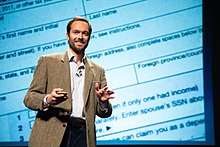Jan-Emmanuel De Neve
| Jan-Emmanuel De Neve | |
|---|---|
 Jan-Emmanuel De Neve at PopTech conference | |
| Born | March 14, 1979 |
| Nationality | Belgium |
| Institution | University of Oxford |
| School or tradition | Behavioral economics |
| Alma mater |
London School of Economics Harvard University |
| Influences |
John Kenneth Galbraith Richard Layard |
Jan-Emmanuel De Neve (born 14 March 1979) is a Belgian economist and professor at the University of Oxford. He is best known for his research on the economics of happiness[1][2] which has led to new insights into the relationship between happiness and income,[3] productivity,[4] economic growth,[5][6] and inequality.[7] His research was selected among "The Management Ideas that Mattered Most in 2016" by Harvard Business Review[8] and he was awarded the Ruut Veenhoven Award in 2015 for his contributions to the scientific study of happiness.[9]
De Neve is an associate editor of the World Happiness Report and a member of the Global Happiness Council and chairs its workplace wellbeing committee.
References
- ↑ Rahim, Zamira. "Norway Is Happiest Country in the World. What's the Secret?". Time. Retrieved 2017-10-01.
- ↑ Morrison, Lennox. "The many upsides of a happy workforce". BBC. Retrieved 2017-10-01.
- ↑ Jha, Alok; correspondent, science. "Happy teenagers earn more as adults". The Guardian. ISSN 0261-3077. Retrieved 2017-10-01.
- ↑ Lufkin, Bryan. "Just how short could we make the working week?". BBC. Retrieved 2018-09-23.
- ↑ Harford, Tim. "Why are recessions so depressing?". Financial Times. Retrieved 2017-10-21.
- ↑ Lam, Bourree. "Why Don't Boom-Times Make People Happier?". The Atlantic. Retrieved 2017-10-21.
- ↑ "Income Inequality Makes Whole Countries Less Happy". Harvard Business Review. Retrieved 2017-10-21.
- ↑ "The Management Ideas That Mattered Most in 2016". Harvard Business Review. Retrieved 2017-10-21.
- ↑ "Ruut Veenhoven Award 2015". www.eur.nl. Erasmus Universiteit Rotterdam. 2017-06-27. Retrieved 2017-10-21.
External links
- Jan-Emmanuel De Neve (home page), University of Oxford
- Publications list and academic citations, Google Scholar .
- Global Happiness Council .
- World Happiness Report .
This article is issued from
Wikipedia.
The text is licensed under Creative Commons - Attribution - Sharealike.
Additional terms may apply for the media files.